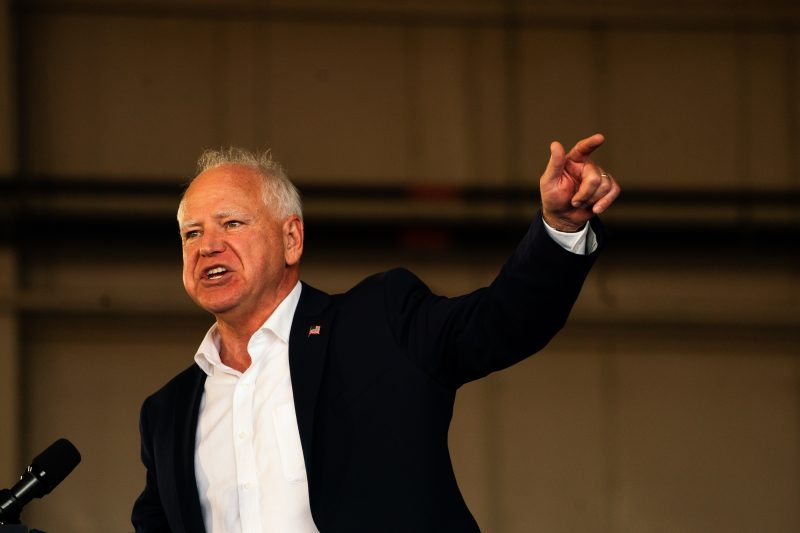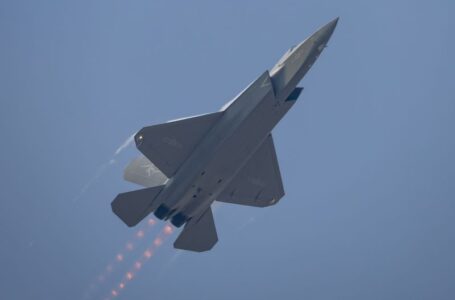Doctors Without Borders halts operations in Haiti’s capital, citing police threats
Assessing claims about Tim Walz’s military service


When Vice President Kamala Harris on Tuesday introduced her running mate, Minnesota Gov. Tim Walz, she lauded his lengthy service in the National Guard: “He is a veteran who served our nation in uniform for more than two decades as a member of the Army National Guard.” Walz played up his service too: “For 24 years, I proudly wore the uniform of this nation. The National Guard gave me purpose.”
Since that moment, Walz’s record has been under attack by Republicans, with claims that he abandoned his troops on the eve of a deployment to Iraq and that, in an instance of “stolen valor,” inflated his credentials and wartime experience.
Here’s an assessment of those claims.
Abandonment of his troops
“When Tim Walz was asked by his country to go to Iraq, you know what he did? He dropped out of the Army and allowed his unit to go without him.”
— GOP vice-presidential candidate JD Vance, Aug. 7
The Washington Post reported that at least three former Guard colleagues have publicly voiced bitterness at Walz’s decision to leave their unit shortly before a possible deployment to Iraq — a deployment that, because it was extended, lasted 19 months. The record shows that Walz made his decision to retire after the National Guard announced the unit might be deployed to Iraq. Walz initially issued a news release indicating he would deploy with his unit.
We constructed the following timeline from interviews, National Guard records and news reports.
April 8, 1981 — Two days after he turns 17, Walz joins the Nebraska National Guard.
1996 — Walz transfers to Minnesota National Guard’s 1st Battalion, 125th Field Artillery.
September 2001 — Though Walz qualified for retirement at 20 years of service, he said in an interview for a Library of Congress oral history project that the Sept. 11 attacks convinced him to reenlist.
Aug. 3, 2003 — Walz’s unit deploys for nine months of active duty, based in Vicenza, Italy, to support Operation Enduring Freedom, the war in Afghanistan. The troops provided security for Air Force bases in Turkey, Italy, Belgium andBritain, with some elements deployed to support stability operations in Bosnia and Kosovo, a unit history says. In the Library of Congress interview, Walz said the experience made him more politically aware.
April 2004 — Walz returns to Minnesota.
Feb. 5, 2005 — Walz, describing himself in a news release as “Mankato West High School teacher and Command Sergeant Major in the National Guard,” files paperwork saying he is exploring running for Congress.
March 17 — TheNational Guard announces possible partial mobilization of 2,000 troops. “The announcement from the National Guard PAO [Public Affairs Office] specified that all or a portion of Walz’s battalion could be mobilized to serve in Iraq within the next two years,” according to a March 20 news release issued by the Walz campaign. “Walz Still Planning to Run for Congress Despite Possible Call to Duty in Iraq,” the headline said.
In the news release, Walz said he “had no plans to drop out of the race.” He also said: “As Command Sergeant Major I have a responsibility not only to ready my battalion for Iraq, but also to serve if called on. I am dedicated to serving my country to the best of my ability, whether that is in Washington DC or in Iraq.”
March 21 — KEYC, a radio station in North Mankato, Minn., broadcasts a report that highlighted Walz’s “unique position” in light of the National Guard announcement. “He will continue his campaign for the congressional seat, despite his possible deployment to Iraq,” the newscast said. “Walz also says if called to active duty in Iraq, his family will continue his campaign back home in Mankato.”
May 16 — The Harris campaign did not respond to a request to provide the day when Walz submitted his retirement papers, but records show this is Walz’s last day with the National Guard. He is 41. His daughter, Hope, is 4. In the Library of Congress interview, Walz said he left the Guard in April “to run for this office.” He said that “we were concerned we would try to do both” and “I decided to retire to focus full time on running.”
Maj. Gen. Randy Manner, U.S. National Guard (ret.), who oversaw overseas deployments, told The Fact Checker that it usually takes at least 90 days to process retirement requests so “60 days would be extraordinarily fast.” Manner said that the Minnesota adjutant general has the final say and could have blocked Walz’s retirement if he thought it would havehad anegative impact on the possible deployment.
A former top official in the Minnesota National Guard at the time, who spoke on the condition of anonymity to avoid being entangled in politics, told The Fact Checker that there was no consideration of blocking Walz’s retirement.
July 14 — Walz’s unit officially receives ordersto deploy.
Oct. 14 — Unit is mobilized.
March 2006 — Unit deploys.
November 2006 — Walz elected to Congress.
October 2007 — Unit returns after deployment was extended.
Assessment: Walz knew that he might soon be deployed to Iraq. However, he had served nearly a quarter-century in the guard and had already announced he was considering a congressional race. He has said he could not do both, and so chose to run for Congress. Whether he abandoned his troops is a matter of perspective, but it is noteworthy that his retirement request was not blocked.
In a statement, the Harris campaign said: “After 24 years of military service, Governor Walz retired in 2005 and ran for Congress, where he was a tireless advocate for our men and women in uniform — and as Vice President of the United States he will continue to be a relentless champion for our veterans and military families.” The campaign did not respond directly to a question about the timing of his resignation and why he left.
Stolen valor claims
Republicans have cited three examples of “stolen valor” — broadly intended to mean Walz is claiming credit for something he did not achieve in the military. The Stolen Valor Act of 2013 makes it a crime to claim to be a recipient of various military medals or badges — andWalz is not accused of that.
‘Command Sergeant Major’
“Walz referred to himself as a retired Command Sergeant Major in his run for Congress and Governor. This is a lie and stolen valor.”
— Ashley Hayek, chief engagement officer, America First Policy Institute, Aug. 7
Walz’s biography on his website says: “After 24 years in the Army National Guard, Command Sergeant Major Walz retired from the 1-125th Field Artillery Battalion in 2005.” At various times, such as in a 2006 C-SPAN interview, he described himself as a command sergeant major. Republicans say that is misleading because he is receiving retirement benefitsfor the rank one level below — master sergeant. That’s because he still needed additional training at the time he retired.
“He held multiple positions within field artillery such as firing battery chief, operations sergeant, first sergeant, and culminated his career serving as the command sergeant major for the battalion,” said Army Lt. Col. Kristen Augé, Minnesota National Guard’s state public affairs officer. “He retired as a master sergeant in 2005 for benefit purposes because he did not complete additional coursework at the U.S. Army Sergeants Major Academy.”
The Harris-Walz campaign on its website initially called Walz a “retired Command Sergeant Major” but then updated his biography to say he “served as a command sergeant major.”
Assessment: This is on the line. He did achieve the title he has claimed, for a total of seven months, but it would be more accurate to say he “served as command sergeant major” rather than claim the title outright.
Operation Enduring Freedom
“Tim Walz Falsely Claimed He Served in Afghanistan.”
— Washington Free Beacon headline, Aug. 7
Walz’s deployment overseas was in support of the war in Afghanistan, dubbed Operation Enduring Freedom, Augé said, saying “the battalion supported security missions at various locations in Europe and Turkey.”
Generally, Walz makes that clear. “I deployed in support of Operation Enduring Freedom,” he said in a 2007 C-SPAN interview. “My battalion provided base security throughout the European Theater from Turkey to England in the early stages of the war in Afghanistan.”
But Republicans have pointed to a 2006 news release by his congressional campaign, which called him “a veteran of Operation Enduring Freedom” and also a 2004 photo in which he is holding a sign saying “Enduring Freedom — Veterans for Kerry.”
Augé said Walz earned a Global War on Terrorism medal but the records are unclear on whether it was a Global War on Terrorism Service Medal or a Global War on Terrorism Expeditionary Medal. A Harris-Walz campaign aide said it was the service medal, which is for individuals who either directly or indirectly supported these designated operations: Airport security, Operation Noble Eagle, Operation Enduring Freedom and Operation Iraqi Freedom.
Assessment: This is also on the line. We can find no evidence Walz ever claimed he served in Afghanistan. He served overseas in support of the Afghanistan war, but sometimes his phrasing might mislead people into thinking he was an Afghanistan veteran.
Carrying weapons
“Well, I wonder. Tim Walz, when were you ever in war?”
— Vance, Aug. 7
The Harris campaign circulated a 2018 clip of Walz arguing in support of gun restrictions. “We can make sure that those weapons of war that I carried in war is the only place where those weapons are at,” he said.
There is no evidence that Walz served in combat — and he has not claimed he did. He did receive ribbons for proficiency in sharpshooting and hand grenades, according to military records obtained through an open records request by MPR News.
“In his 24 years of service, the Governor carried, fired and trained others to use weapons of war innumerable times,” a Harris-Walz campaign aide said. “Governor Walz would never insult or undermine any American’s service to this country — in fact, he thanks Senator Vance for putting his life on the line for our country. It’s the American way.” The aide did not address his use of the phrase “in war.”
Assessment: Walz’s language was sloppy and false. He did carry weapons of war — just not in war.
(About our rating scale)
Send us facts to check by filling out this form
Sign up for The Fact Checker weekly newsletter
The Fact Checker is a verified signatory to the International Fact-Checking Network code of principles











